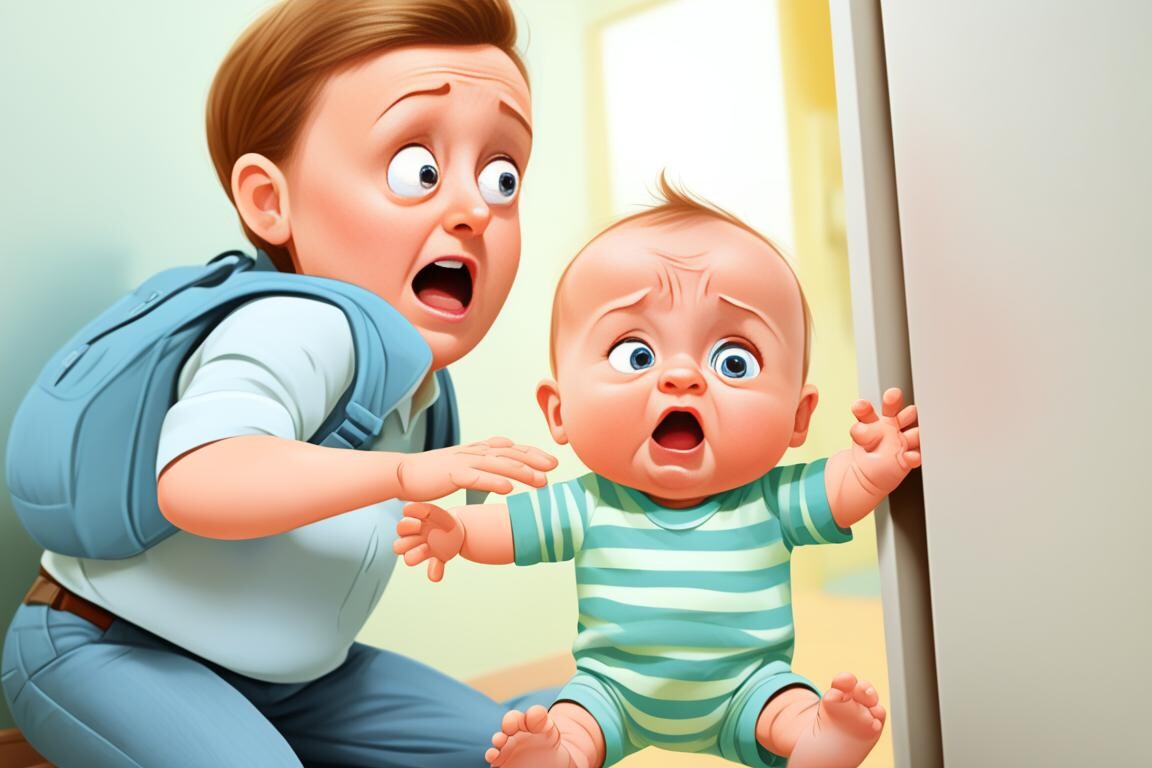Have you ever felt nervous, panicky, or deeply sad when someone you love leaves the house? Maybe your child cries nonstop when you drop them off at school, or your dog howls when you’re at work. These situations may seem different, but they all stem from the same issue — causes of separation anxiety.
Whether you’re a worried parent, a struggling adult, or a pet owner, understanding the causes of separation anxiety can help bring calm to chaos.
Experts say it comes from both biology and environment. Things like your genes, brain chemistry, stress, trauma, and family life can trigger it.
In this blog, we will break down why this problem happens, how it shows up in kids, adults, and even pets, and what you can do about it.
Table of Contents
ToggleWhat is Separation Anxiety?
Separation anxiety is the fear or distress people (or pets) feel when they are apart from someone they are emotionally attached to. It can lead to panic, crying, clinginess, and even physical illness. This anxiety doesn’t just affect children. It can show up in teens, adults, and animals too.
Understanding the causes of separation anxiety is key to solving it early and avoiding long-term emotional or mental health issues.
Understanding Separation Anxiety Across Age Groups
Separation anxiety doesn’t look the same for everyone. Age and emotional development play a big role.
Infants and Toddlers
Babies form strong bonds with caregivers. Around 8 months, they begin to notice when you’re gone.
- Crying when parents leave the room
- Trouble sleeping alone
- Fearful of strangers
About 4% to 5% of children develop separation anxiety disorder that goes beyond typical development (Journal of Anxiety Disorders).
School-Age Children
Older kids may have school refusal or panic when separated from parents.
- Complaining of stomach aches before school
- Constant worry about the safety of caregivers
- Trouble focusing in school
Teenagers
Teens may show emotional signs like:
- Avoiding social events or sleepovers
- Needing constant texting or calling
- Mood swings and irritability
Adults
Separation anxiety in adults is more common than we think.
- Panic at the idea of losing a loved one
- Avoiding travel or work trips
- Clingy behavior in relationships
Pets (Dogs, Cats)
Separation anxiety in pets often shows up through destructive behavior.
- Barking, whining, or howling when left alone
- Destroying furniture
- Soiling the house despite being trained
Stat: Nearly 20–40% of dogs referred to behavior clinics suffer from separation anxiety (American Veterinary Medical Association).
What Are the Causes of Separation Anxiety?
The causes of separation anxiety are not always easy to spot, but they often begin with a mix of genetics, environment, and life events.
Biological and Genetic Factors
Separation anxiety can run in families. Brain chemicals and how we’re wired genetically matter.
- Children with a family history of anxiety are 2–3x more likely to experience separation anxiety disorder.
- The amygdala (fear center in the brain) is hyperactive in anxious people.
- Higher cortisol levels increase stress response.
Environmental Triggers
What happens in our surroundings affects our mental health deeply.
- Losing a parent or caregiver early in life
- Experiencing abuse, neglect, or trauma
- Divorce or frequent moves
- Overprotective parenting can fuel fear of independence
These triggers of separation anxiety create a deep fear of losing safety.
Life Transitions & Stressful Events
Big changes in life can bring fear and worry.
- Starting school or moving to a new city
- A loved one passing away
- Relationship breakups or divorce
- A new nanny or daycare change for kids
- Returning to office after working from home
Attachment Styles & Personality Traits
Some personalities are more prone to emotional attachment and fear of being left.
- Anxious-preoccupied attachment: overly dependent on others for emotional support
- Introverted or emotionally sensitive people
- People who fear change or are highly routine-based

Separation Anxiety in Adults: Causes and Triggers
Separation anxiety in adults can be deeply rooted. It’s not just about missing someone.
Unresolved Childhood Anxiety
Sometimes, past experiences never really go away.
- Childhood fears come back during adult life changes
- Adults may not recognize the signs as anxiety
- Early loss or trauma often resurfaces
Relationship-Based Anxiety
Fear in relationships is a top reason for separation anxiety in adults.
- Fear of rejection or being left alone
- Trauma from toxic or abusive relationships
- Becoming overly dependent on a partner
Underlying Mental Health Issues
Other mental health conditions often feed anxiety.
- Depression can make separation feel unbearable
- Panic disorder can worsen when loved ones are gone
- Generalized anxiety disorder (GAD) often overlaps with separation anxiety
What Causes Separation Anxiety in Pets?
Separation anxiety in pets isn’t about misbehavior. It’s real anxiety.
Changes in Routine
Sudden changes throw pets off balance.
- Owners working from home during COVID, then returning to office
- Moving to a new home
- New people in the household
Lack of Training or Socialization
Some pets didn’t get enough exposure early on.
- Rescue animals with past trauma
- Isolation during critical development stages
- Never being taught to be alone calmly
Traumatic Events
Bad experiences can leave lasting fears.
- Being rehomed or abandoned
- Abuse or neglect
- Loud noises or being locked alone for long hours
Stat: 20–40% of dogs taken to behavior clinics suffer from pet behavioral issues related to separation.
Risk Factors for Developing the Disorder
Some factors can make a child more likely to get separation anxiety disorder. Knowing about risk factors for separation anxiety disorder and predictors of separation anxiety helps parents and caregivers spot children at risk.
A big risk is having a family history of anxiety. Kids with a family member who has anxiety are more likely to get it too. This points to a possible genetic link.
Going through tough times, like losing someone close or big changes at home, can also raise the risk. Kids who’ve faced big challenges or changes in their close relationships might feel more scared and upset when away from their caregivers.
How a child is naturally wired can also matter. Kids who are easily scared, anxious, or stress out easily are more likely to get separation anxiety. They might feel more anxious when away from those they love.
Also, kids with caregivers who are too worried or give too much comfort are at higher risk. When parents or guardians always try to ease their child’s fears, it can make the child more anxious and clingy.
Key Risk Factors:
- Family history of anxiety disorders
- Exposure to traumatic life events
- Temperament characterized by high fear and stress reactivity
- Overprotective or anxious caregivers
Knowing these risk factors for separation anxiety disorder and predictors of separation anxiety helps parents, teachers, and mental health workers. They can spot kids at risk early and offer help.
Childhood Experiences and Separation Anxiety
Childhood is key for growing emotionally. Big events during this time can deeply affect a child’s mental health. Loss of a loved one and parental divorce or separation are two big factors that impact a child’s feelings.
Loss of a Loved One
When a child loses a parent, sibling, or another close family member, it can cause a lot of grief. This can make a child very scared and worried about being away from their family. They might start to feel anxious about being separated, leading to separation anxiety disorder.
Parental Divorce or Separation
Parental divorce or separation can also make a child feel very stressed and unsure. The change in the family and possibly seeing one parent less can make a child feel anxious. They might worry about keeping close to their loved ones.
Not every child who goes through these events will get separation anxiety disorder. But these experiences can make a child more likely to feel anxious. It shows why early help and support are important for them.
Causes of Separation Anxiety
Understanding why some kids get separation anxiety is key. It’s caused by a mix of biology, psychology, and environment. Some kids might be more likely to feel anxious because of their genes or brain chemistry. Stress and bad experiences can also make it worse.
Having a family history of anxiety can make kids more likely to feel separation anxiety. If a parent or relative has anxiety, the child might too. This could be because of differences in brain chemistry and stress response.
Environmental factors also play a big part. Stressful events like losing a loved one or going through a divorce can make kids more anxious. How parents deal with their child’s feelings and teach them to cope matters a lot.

Knowing what causes separation anxiety helps parents and doctors find better ways to help. Getting advice from a skilled pediatric neurologist can make a big difference for families dealing with this issue.
Adolescent and Adult Onset
Separation anxiety isn’t just for kids. It can start or continue into the teenage years and adulthood, known as late-onset separation anxiety. The reasons for feeling anxious when apart from others can be different for teens and adults compared to kids.
Major Life Changes
Big changes in life, like going to college, getting married, or having a child, can lead to separation anxiety in adults. These changes can upset the usual routines and relationships that people depend on. This can make them feel more anxious and insecure.
Illness or Loss of Attachment Figure
Losing a close family member or partner can also cause separation anxiety in teens and adults. Feeling sad and losing the bond with someone important can make them very anxious and scared. They may find it hard to deal with not having their loved one around.
It’s important to understand what causes separation anxiety in teens and adults. By addressing these issues and teaching coping skills, we can help them deal with this tough condition.
Distinguishing Normal Separation Anxiety
Young children often feel a normal amount of separation anxiety as they grow. This is a normal part of growing up and shouldn’t be confused with a disorder. While all babies and toddlers may feel upset when away from their main caregivers, separation anxiety disorder is much worse, lasting longer and affecting daily life.
Age-Appropriate Expectations
Knowing what’s normal for different ages helps parents see when a child might need help. Babies and toddlers up to 3 years old might cry or cling when left by a parent. But if these feelings don’t go away or stop them from doing normal things, it could be a bigger issue.
- Infants (0-12 months): Mild distress when a parent leaves, but can be soothed and comforted.
- Toddlers (1-3 years): Increased separation anxiety, with more intense reactions to a parent’s departure, but still able to be calmed.
- Preschoolers (3-5 years): Separation anxiety should start to decrease, with the child able to engage in activities without constant need for a parent’s presence.
If you’re worried about your child’s anxiety, talk to a healthcare professional. Getting help early can stop things from getting worse and keep your child emotionally healthy.
Complications of Untreated Separation Anxiety
Untreated separation anxiety can cause big problems in both kids and adults. It’s important to know the effects to get help early and avoid long-term harm.
Kids with this issue might have trouble in school. They might not focus well or do well on tests. Making friends can also be hard because they worry too much about being away from family.
This fear can stop them from joining in with other kids and doing fun activities outside of school. It can limit their chances to grow and be happy.
Grown-ups with separation anxiety face big challenges too. They might find it hard to go to work because they can’t be away from family. Being in a relationship can also be tough because they fear losing their partner.
They might not be able to live on their own or handle everyday tasks. This can really affect their life quality.
Not dealing with separation anxiety can lead to more than just feeling sad. Getting help early is key to avoid these problems. It helps people live happy, independent lives.
- Academic struggles
- Difficulty forming social connections
- Disruption to work and relationships
- Inability to live independently
- Reduced quality of life
Early Intervention and Treatment
If you or someone you know is dealing with separation anxiety disorder, getting help early can really help. A good anxiety treatment plan often includes therapy and sometimes medication.
Therapy Approaches
Cognitive-behavioral therapy (CBT) and exposure therapy are great for managing anxiety. They help people face their fears step by step. This way, they learn to deal with their anxiety and find ways to cope.
Medication Options
For those with severe separation anxiety, doctors might suggest antidepressants or anti-anxiety drugs. These can help balance brain chemistry and ease symptoms. Used with therapy, they make a strong treatment plan.
Getting help early and with a plan tailored to you is crucial for beating separation anxiety. With the right therapy and medication for anxiety, many people can live happy, independent lives.
Conclusion
Separation anxiety is a complex issue that deeply affects people’s lives. But, it’s a treatable disorder with the right approach. By understanding its causes, you can find ways to prevent and treat it.
For those facing separation anxiety, know you’re not alone. With the right treatments and professional help, you can improve your emotional strength and happiness. By tackling the causes and using strategies that fit you, you can better your mental health.
Keep learning about separation anxiety and how to manage it. Remember the key points on causes and treatment, and the need for tailored strategies. With the right support, you can beat separation anxiety and live a fuller, more connected life.
FAQ
What are the causes of separation anxiety?
Separation anxiety comes from both nature and nurture. It’s linked to genes, brain chemistry, stress, trauma, and family issues.
What is the difference between normal separation anxiety and separation anxiety disorder?
Normal separation anxiety is common in kids. But, it turns into a disorder when it’s too strong and affects daily life.
How do biological factors contribute to separation anxiety?
Genetics and brain chemistry can cause separation anxiety. Kids with anxious family members or brain chemistry issues are more likely to have it.
What environmental triggers can contribute to separation anxiety?
Stressful events like losing a loved one or moving can make kids more anxious about being apart. Family dynamics and seeing anxious behaviors can also affect a child’s feelings.
What are the risk factors for developing separation anxiety disorder?
Being at risk includes a family history of anxiety, trauma, and being easily stressed. Kids who have bad attachment experiences or overly anxious caregivers are also more likely to get it.
How can childhood experiences impact the development of separation anxiety?
Childhood events like losing someone close or parents getting divorced can deeply affect a child. These events can make kids very scared of being away from their loved ones.
Can separation anxiety disorder develop in adolescence and adulthood?
Yes, it can start or continue into the teenage years and adulthood. Big life changes or losing someone close can trigger it in older people.
How can I distinguish between normal separation anxiety and separation anxiety disorder?
Normal separation anxiety is usual in kids. But, the disorder is more intense and affects daily life.
What are the potential complications of untreated separation anxiety disorder?
Without treatment, it can cause problems in school, social life, and development. In adults, it can affect work, relationships, and living independently.
How is separation anxiety disorder treated?
Treatment combines therapy and sometimes medicine. Therapy like CBT helps manage anxiety. In severe cases, medication can help with brain chemistry.
Source Links
About The Author

Medically reviewed by Dr. Chandril Chugh, MD, DM (Neurology)
Board-Certified Neurologist
Dr. Chandril Chugh is a U.S.-trained, board-certified neurologist with expertise in diagnosing and managing neurological disorders, including migraines, epilepsy, Parkinson’s disease, and movement disorders. His clinical focus includes evidence-based neurological care and patient education.
All content is reviewed for medical accuracy and aligned with current neurological guidelines.




